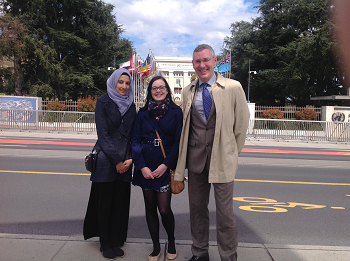University News Last updated 06 April 2016

Last week a Birmingham City University delegation comprising of Professor Jon Yorke and PhD students Amna Nazir and Alice Storey (both of whom are working on the United Nations) attended a high level human rights meeting with diplomats (Permanent Missions), national human rights institutions, scholars and civil society stakeholders.
The meeting was the presession of the 25th Universal Periodic Review (UPR) which is to be held at the Human Rights Council in Geneva in May.
The delegation were attending in their capacity as representatives of the Sudanese Human Rights Initiative, which was founded by School of Law alumnus, Mr Elshareef Mohammed, who was awarded the 2015 Birmingham City University Alumni of the Year Award.
The presession is organised by the international NGO, UPRinfo, based in Geneva, and provides civil society stakeholders with an opportunity to present initial reports to Permanent Missions and delegations to the UN, such as the European Union Delegation and the African Union Permanent Observer Mission.
Permanent Missions have an opportunity to identify priority issues to be raised in the UPR, and also initiate bilateral and multilateral discussions to take place for alliance building on circumstances to be highlighted. This process is designed to facilitate a strategic approach to help protect human rights around the world.
The countries under review at the presession were Greece, Hungary, Ireland, Papua New Guinea, Samoa, Sudan, Suriname, Swaziland, Tajikistan, Tanzania and Thailand. The issues raised by country stakeholders included the current overcrowding of prisons in Ireland, Thailand’s violation of indigenous peoples rights regarding citizenship and land rights, and the denial of the right to privacy as the state was increasing its surveillance technologies against human rights defenders.
Tanzania was called upon to implement the Convention for the Elimination of Discrimination Against Women, and to protect the rights of journalists and the freedom of the media.
Professor Jon Yorke said:
Perhaps the most significant development for the logistical operations of the UPR presession was the fact that the Sudanese government intercepted four representatives of Sudanese civil society and prevented them from presenting at the presession. This action by the Sudanese government was a very concerning example of the continuation of human rights violations.
The African Centre for Justice and Peace and the Sudanese Human Rights Initiative worked to formulate cross-regional support from Permanent Missions to speak out against the travel restrictions. ACJP provided a press release in which 37 Sudanese and international groups and eight prominent Sudanese individuals stated, “Sudan should immediately return the passports and allow the free participation of civil society in the UPR Process without fear or intimidation.”
The International Federation for Human Rights (FIDH) called the restriction on travel an, “outrageous move by Sudan’s government.” Mr Maina Kiai, the UN Special Rapporteur on the Rights to Freedom of Peaceful Assembly and Association is also monitoring the situation, and the EU delegation to the UN are providing support for the protection of the Sudanese civil society attending the UPR.
The UPR presession should be free to all presenting stakeholders. It is a human rights violation if governments prevent civil society from engaging in this fundamentally important multilateral dialogue for the protection of human rights.